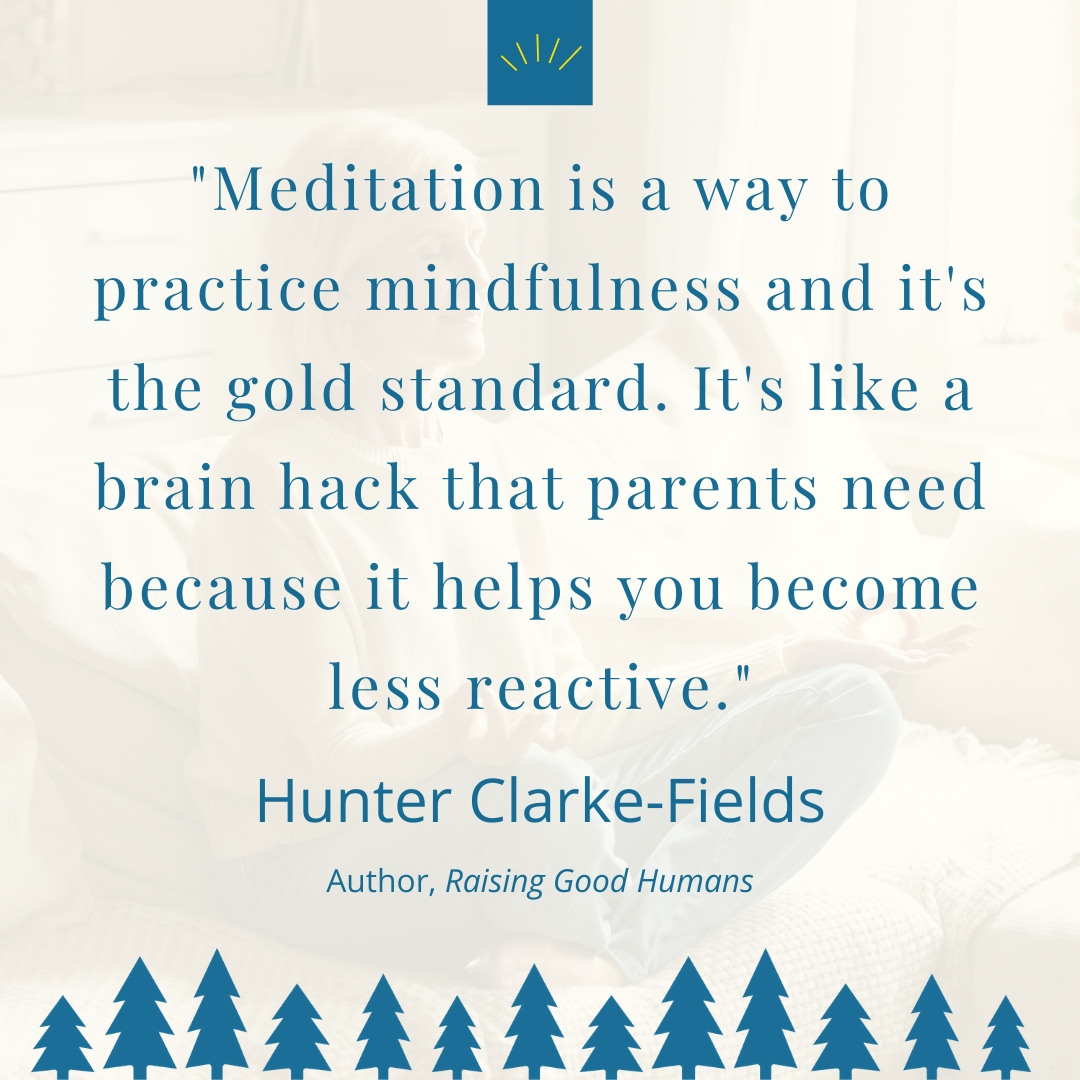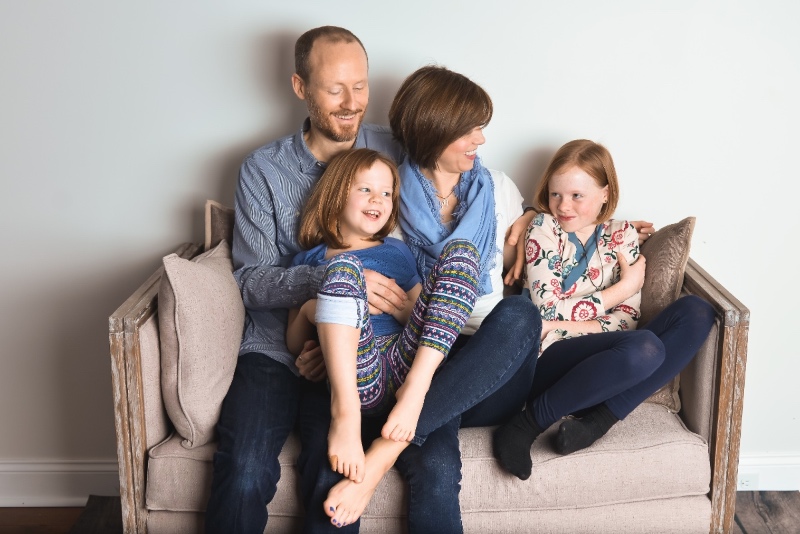Ep. 117: Raising Good Humans
Sunshine Parenting - A podcast by Audrey Monke

Categories:
Show notes & links available here.
In this episode, I'm chatting with mindfulness expert Hunter Clarke-Fields, author of Raising Good Humans: A Mindful Guide to Breaking the Cycle of Reactive Parenting and Raising Kind, Confident Kids, is my guest on for Episode 117. We talk about the importance of modeling positive responses to difficult situations and using tools like mindfulness and meditation to be a less reactive parent. Hunter's blog, podcast, and other resources can be found at MindfulMamaMentor.com.
Big Ideas
- Raising Good Humans is a book that offers tools and ideas for parents on:
- how to regulate your stress response
- how to become less reactive
- how to respond in order to get more cooperation from your children
- There are 2 main parts of the book:
- The Inner Work
- mindfulness, unhooking from negative thoughts, meditation
- learning about your own triggers
- how to manage difficult feelings and model problem solving
- self-compassion.
- The Outer Work -- Skillful Communication
- The Inner Work
- Mindfulness is the intentional ability to stay in the present moment with a sense of kindness and curiosity.
- The benefits of a meditation practice are reduced anxiety and depression, better sleep, more feelings of wellbeing and being less reactive.
- Our own childhood impacts so much of who we are and how we parent our kids.
- Parents can acknowledge that most kids have a different pace. Being patient with them can help circumvent conflict.
- Use the "Friend Filter" by speaking to your child as respectfully as you would a friend or a friend's child.
Quotes
Audrey: "In this day and age, with all the inputs we have, and how most parents are struggling with the overwhelm, anxiety rush and can't turn it off--this is why your message is so needed right now."
Hunter: "There are basically these two wings that you need to fly. One is this wonderful advice out there in the parenting world, what to say and how to communicate. But that goes out the window when you're losing it because you can't access it. You literally can't access that part of your brain, the prefrontal cortex where your verbal empathetic ability is, so there is also inner work that goes along with it."
Hunter: "There's a word in the mindfulness tradition called 'noble failure' because we all fail at being able to control our monkey mind. But that's okay. That's not how you judge your practice. You judge your practice and how it helps you by how it makes you feel and how you're able to be present in the other parts of your life."

Hunter: "We're at our worst in parenting when we're just reacting in anger. We have to have a way to calm it down. We have to build the muscle to calm or be able to be less reactive in peaceful times. This is a muscle you're building. Just like you're not going to read about tennis and then go out and play the world grand slam."
Audrey: "In our family, we talk about our highs and lows. Let's make sure we are not just sharing the good stuff, or sharing only the positive feelings, because we've got to get those bad things out, too. Even when you're a generally positive, upbeat person, there are always hard things."
Hunter: "We expect our kids to turn things around and have this awareness when we don't have it ourselves. The ability to look at and understand our feelings is so practical. If you only show your kids a veneer of perfection, 'I'm always positive' and 'I'm always calm' -- that's just not true. Nobody is like that. Even the Dalai Lama gets mad sometimes."
Hunter: "We can give lip service that 'It's okay for you to have these feelings,' but then we don't allow ourselves permission to be angry, frustrated, or sad. We hide that away rather than acknowledging that within ourselves. That piece of acknowledgment is really crucial to all this work."
Hunter: "If you go into a situation where you're feeling upset or when you're starting to get annoyed, when you can say these things out loud and just label those (emotions), it actually provides a lot of relief to the stress and tension of a moment."
Audrey: "I think its really important for us as parents to be real with each other and make sure that we all know that we have these moments. Just working on having fewer of the bad moments feels so good."
Hunter: "The second part of the book is about how to be helpful, how to speak in such a skillful way that your child wants to cooperate with you--from the inside out--because they care about you, rather than because you're using power over them and making them."
Hunter: "There is this idea we have that its the norm for adolescents to rebel. I really think that it's not true. Actually, adolescents rebel against the kind of destructive communication and parenting habits that we have. Culturally, we're not very skillful."
Hunter: "We are in the soup of a very unskillful culture where we are constantly ordering and threatening our kids. Some of these things feel like they work in the short term, but in the long term they actually make kids less likely to want to cooperate with you."
Hunter: "There are natural consequences to some things that happen and we definitely hold boundaries, but there are ways to speak and ways to communicate and interact that create a more loving, cooperative relationship."
Audrey: "Even as adults, we respond better to being told we get to do something fun or have some kind of privilege because we did our task or met a goal."
Hunter: "If you had a friend staying with you, or even if you were talking to one of your friend's children, someone who's a little more removed from you, how would you ask that person? How would you make the request to that person? Putting on this filter can help us look at our own language."
Audrey: "We are often frustrated that they're not immediately doing something, but that's more our problem. If you want your kids to be sitting down for dinner, tell them five minutes before you actually need to sit down."
Hunter: "That's why self-compassion is so important. We're not robots. We're not going to get it right. We're not going to be perfect all the time. We're going to be aware for a little while of what we're not doing right--and that doesn't feel good--but it's part of the learning process."
Audrey: "Not only do we need to think about how we talk to our kids, like we are talking to a friend, but also how we talk to ourselves. We get so disappointed in ourselves when we're trying to do new things. But any new habit or communication style is going to take time."
Audrey: "We don't need to get overwhelmed with all of it. Even if you apply just one of your ideas, it would move the needle on raising the connection and peacefulness in the home."

Resources
ABOUT HUNTER
Hunter Clarke-Fields is a mindfulness mentor, host of the Mindful Mama podcast, creator of the Mindful Parenting membership, and author of the brand new book (12/19), Raising Good Humans: A Mindful Guide to Breaking the Cycle of Reactive Parenting and Raising Kind, Confident Kids. She helps parents bring more calm into their daily lives and cooperation in their families. Hunter has over twenty years of experience in meditation and yoga practices and has taught mindfulness to thousands worldwide. She is the mother of two active daughters, who challenge her every day to hone her craft! Learn more about Hunter at MindfulMamaMentor.com.
Contact Hunter: [email protected]
Raising Good Humans Book Page: Raising Good Humans Book.com
Facebook Page: Hunter Clarke-Fields, Mindful Mama Mentor
Instagram: Mindful Mama Mentor
Twitter: HClarkeFields
LinkedIn: Hunter Clarke-Fields
Related
If you enjoyed listening to this podcast, check out:
Ep. 103: How to Stop Losing Your Sh*t with Kids
Ep. 80: The Emotionally Healthy Child with Maureen Healy
Ep. 97: Parenting the Challenging Child with Signe Whitson
